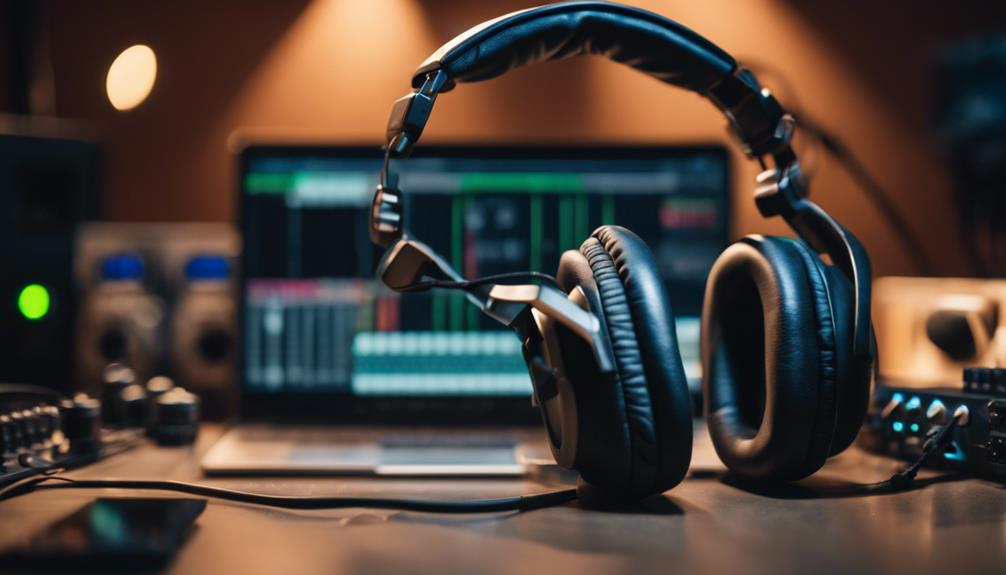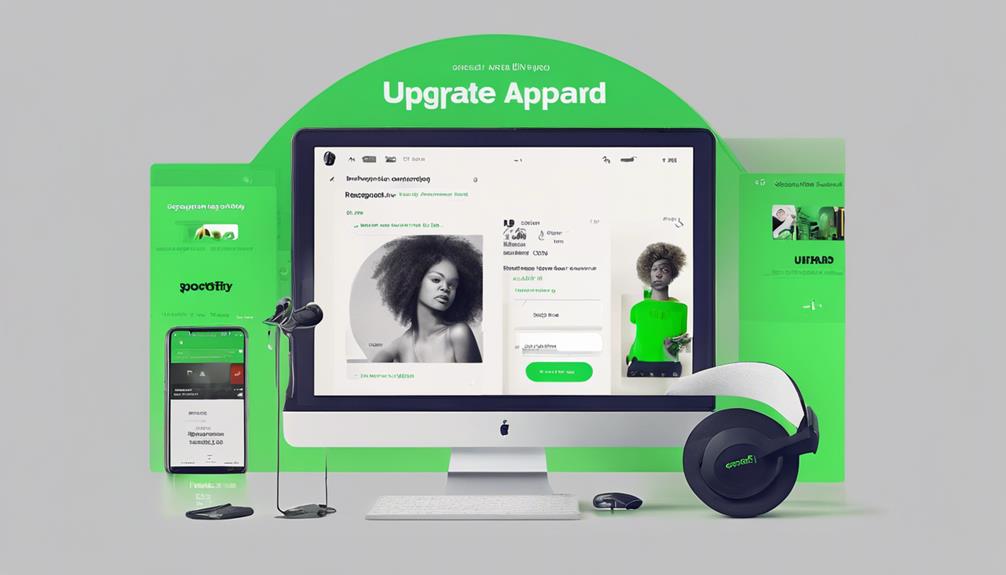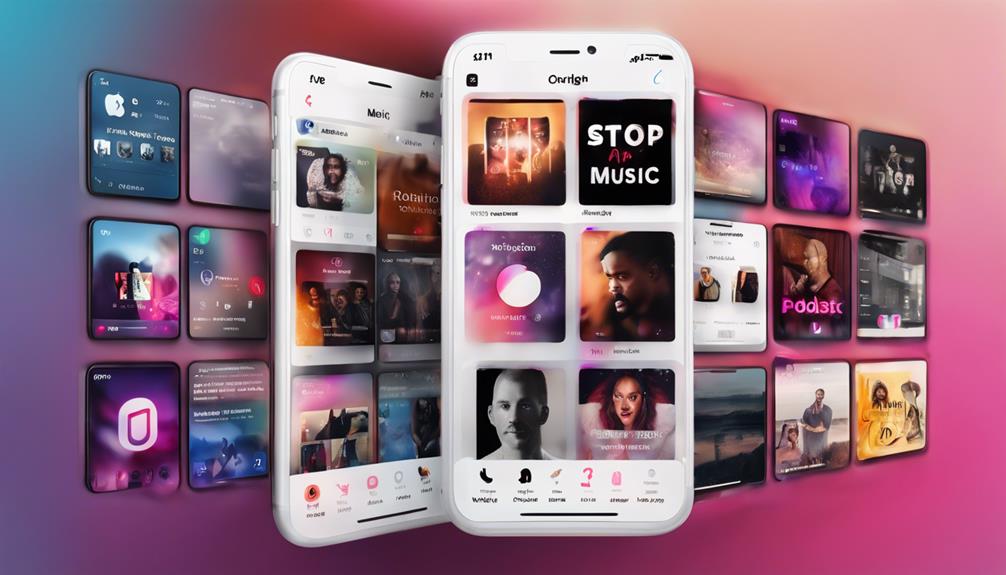Podcasting is a dynamic way to create, share, and enjoy audio content on diverse topics. It emerged in 2004, initially focusing on radio and audio blogs. Various formats like fiction and video cater to different preferences. With podcasting technology, one needs hosting services, RSS feeds, and mobile accessibility. Creating podcasts involves basic equipment and software, along with engaging with the audience. Strategies for monetization include advertising, sponsorships, premium content, and crowdfunding. To promote podcasts effectively, use targeted marketing and SEO tactics. Engaging with the audience, fostering loyalty, and staying consistent are key for building a dedicated listener base. Learn more about the intricacies of podcasting for a thorough understanding.
Key Takeaways
- Digital audio files shared online.
- Coined in 2004 for radio content.
- Hosted on platforms with RSS feeds.
- Various formats like fiction and video.
- Accessible on mobile devices.
What Is a Podcast?
Podcasting involves creating and sharing digital audio files online for streaming or download. These audio files, known as podcasts, serve as a platform for distributing audio content to a wide audience. Unlike traditional radio programs, podcasts offer listeners the flexibility to access episodes at their convenience. The beauty of podcasts lies in their versatility, covering a vast array of topics from parenting to entrepreneurship, all through the power of audio.
In the domain of digital media, podcasts have revolutionized the way we consume information and entertainment. The convenience of being able to listen on-the-go has propelled podcasts to popularity, with millions of episodes available globally. The term 'podcast' itself is a fusion of 'iPod' and 'broadcast,' highlighting its origins in the digital age.
As we explore the world of podcasts, we uncover a treasure trove of diverse audio content waiting to be explored. From engaging storytelling to informative discussions, podcasts offer a unique avenue for both creators and listeners to connect through the art of spoken word.
Evolution of Podcasting

In 2004, the term 'podcast' was coined, blending 'iPod' and 'broadcast,' marking the beginning of a new era in digital media distribution. Initially, podcasts encompassed downloadable radio content and audio blogs, paving the way for modern distribution through RSS feeds. Apple's formal support for podcasts in iTunes 4.9 in 2005 revolutionized podcast discovery and consumption, propelling the medium's popularity. The innovative concept of associating audio and video files with RSS feeds, proposed in 2000, laid the groundwork for the podcasting landscape we see today.
Podcasting has evolved into a global platform for sharing digital audio content, attracting an increasingly diverse audience of listeners. With platforms like Apple Podcasts leading the way, podcasts have become a staple in the digital media diet of many. The evolution of podcasting highlights the seamless integration of technology and creativity, shaping the way we engage with audio content in the digital age.
Benefits of Podcast Consumption

Engaging with podcasts enhances our daily routines by offering informative and entertaining content for various activities like driving or exercising. Multitasking becomes seamless as 52% of listeners tune in while on the go, and 46% incorporate podcasts into their workout routines.
The high engagement levels are evident, with 80% of listeners enjoying most or all of each episode they listen to. Additionally, podcast advertising holds significant sway over the audience, with 54% more inclined to contemplate purchasing from a brand after hearing its ad on a podcast. The effectiveness of podcast advertising is further highlighted by the fact that 78% of listeners prefer podcast ads over other forms of marketing.
This loyalty extends to content consumption as well, with 80% of listeners staying tuned for most or all episodes of their favorite podcasts. The benefits of podcast consumption aren't only in the content itself but also in the engaging advertisements that captivate audiences.
Types of Podcast Formats

With a variety of podcast formats available, listeners can explore different styles to suit their preferences and interests. Fiction podcasts, for example, bring fictional stories to life using voice actors, sound effects, and music, creating an immersive experience. These podcasts often unfold over multiple episodes, keeping audiences engaged with original audio content.
On the other hand, video podcasts offer a more visual experience by incorporating video elements alongside audio content, such as showcasing NASA's Crab Nebula. Enhanced podcasts take it a step further by combining audio with slide show presentations, adding a visual component to the audio content for a richer experience.
Additionally, theatrical podcasts provide a unique twist by delivering storytelling in a dramatic format, akin to a stage performance. These podcasts may feature live recordings or use sound effects to enhance the narrative, captivating listeners with the power of sound. Each format offers a distinct way to enjoy content, catering to the diverse preferences of podcast enthusiasts seeking innovative and engaging audio experiences.
Podcasting Technology Overview

Exploring the technical aspects of podcasting, we investigate the world of Podcasting Technology Overview.
- Podcast Hosting: Podcast hosting companies like SoundCloud and Libsyn play a vital role in storing and distributing podcast episodes efficiently.
- RSS Feeds: RSS feeds are essential for syndicating podcasts, enabling easy distribution across various platforms and reaching a wider audience.
- Audio Files: Podcast creators typically encode their episodes in mp3 format, ensuring compatibility with a wide range of devices for seamless listening experiences.
- Mobile Device: With the rise of mobile technology, podcasts have become increasingly accessible on-the-go, allowing listeners to enjoy their favorite shows anytime, anywhere.
These technological components form the backbone of podcasting, empowering creators to share their content effortlessly and enabling audiences to engage with diverse and enthralling audio experiences.
The integration of podcast hosting services, RSS feeds, optimized audio file formats, and mobile accessibility has revolutionized the podcasting landscape, making it a dynamic and innovative medium for content consumption.
How to Create a Podcast

Let's explore the process of creating a podcast, starting with the essential equipment and recording software needed.
To initiate a podcast, you need basic tools like a microphone and recording software. Once you have your equipment ready, it's time to record your first episode. After recording, you can use editing software to improve the audio quality and add any necessary effects.
When your episode is prepared, you can upload it to a media player or podcast hosting platform. Consider submitting your podcast to directories like Google Podcasts to reach a broader audience.
Creating a podcast is a rewarding way to share your voice and content with listeners worldwide. Remember to engage with your audience and consistently release new episodes to maintain their interest.
With the right tools and dedication, starting a podcast can be a simple process that allows you to express your creativity and connect with others through digital media.
Monetization Strategies for Podcasters

Podcasters can enhance their revenue streams by implementing diverse monetization strategies such as advertising, sponsorships, and affiliate marketing. These strategies can help podcasters generate income and grow their audience. Here are some innovative ways podcasters can monetize their content:
- Advertising: By partnering with brands for ad placements within episodes, podcasters can earn money based on the number of listens or views these ads receive.
- Sponsorships: Securing sponsorships from companies relevant to their content can provide podcasters with financial support in exchange for promoting the sponsor's products or services.
- Premium Content: Offering exclusive content or bonus episodes to subscribers who pay for a premium membership can create a steady source of income for podcasters.
- Crowdfunding: Utilizing platforms like Patreon or accepting donations from listeners can help podcasters fund their shows and cover production costs, allowing for greater creative freedom.
Promoting Your Podcast

To effectively promote your podcast, utilize tools like Mailchimp for targeted advertising, intriguing emails, and social media management.
Incorporate storytelling, varied content, guest appearances, and interactive elements to create engaging podcast episodes that attract and retain listeners.
Consistently maintaining a schedule for releasing episodes keeps your audience engaged and builds a dedicated listener base.
Marketing Strategies
Utilize targeted advertising and social media management tools like Mailchimp to effectively promote your podcast. When marketing your podcast, consider the following innovative strategies:
- Storytelling: Craft compelling narratives to captivate your audience and keep them coming back for more.
- Guest Appearances: Invite industry experts or influencers to add value and attract new listeners.
- Interactive Elements: Engage your audience with quizzes, polls, or Q&A sessions to create a more immersive experience.
- Consistent Schedule: Release new episodes regularly to maintain listener interest and loyalty.
Engaging With Audience
Engaging with your audience is a critical aspect of promoting your podcast successfully. To enhance engagement, consider using tools like Mailchimp for targeted advertising, compelling emails, and efficient social media management.
Creating engaging content through storytelling, varied topics, guest appearances, and interactive elements can help retain listeners. It's important to maintain a consistent schedule to keep your audience eagerly anticipating each episode.
By tracking listener analytics, gathering feedback, and leveraging social media platforms, you can better understand your audience's preferences and measure the impact of your podcast. Remember, promoting your podcast is essential for attracting more listeners and increasing your reach.
Actively engaging with your audience, responding to feedback, and building a sense of community around your podcast can foster loyalty and growth.
Frequently Asked Questions
What Is a Podcast in Simple Terms?
Podcasts, in simple terms, are digital audio files available online for streaming or download. They form a series with specific themes, covering a wide range of topics. Hosts present spoken content, and listeners access podcasts for free, with monetization through advertising or listener support.
The term 'podcast' combines iPod and broadcast, first used in 2004. Podcasts offer an engaging way to explore diverse subjects and perspectives, enhancing the listener's experience.
What Is the Literal Meaning of Podcast?
When we talk about the literal meaning of podcast, we're referring to a digital program available for download or streaming over the internet.
The term 'podcast' originally blends 'iPod' and 'broadcast', emphasizing the portability and widespread availability of these audio shows.
It's fascinating how this medium has evolved and diversified over the years, offering listeners a wide range of content and formats to enjoy on the go.
What Is Podcasting Examples?
We see podcasting examples everywhere nowadays. From Alex Cooper's watch parties at the Paris Olympic Games to Raven and Miranda's latest episode, the podcasting world is buzzing.
Even in sports, like Tony Holt's Razorbacks basketball podcast, there's no shortage of engaging content.
Companies like Audible and Spotify may have made cuts, but the podcasting community remains vibrant and diverse, offering a wide range of shows for every interest.
What Is the Official Definition of a Podcast?
When defining a podcast, it refers to a digital audio file that can be downloaded or streamed over the internet. These episodes are usually part of a series centered on specific themes.
The term 'podcast' blends 'iPod' and 'broadcast' together. Listeners can access podcasts for free, and they're commonly monetized through advertising.
Podcasting entails creating and sharing audio files through RSS feeds for easy distribution.
Conclusion
As we wrap up our exploration of podcasting, remember that like a well-crafted symphony, podcasts are a harmonious blend of voices and ideas that resonate with listeners.
Just as each note contributes to the melody, each podcast episode offers a unique perspective or story that enriches our lives.
So, whether you're a creator or a listener, embrace the power of podcasting to connect, inspire, and uplift in this digital age.










